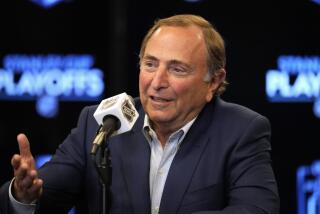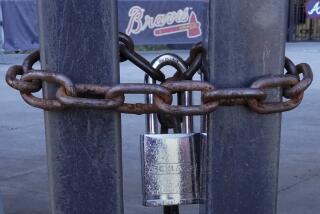NHL hits players’ wallets, cancels regular-season games to Oct. 24
- Share via
The NHL on Thursday used its most potent hammer and ensured locked-out players will lose at least one paycheck when it canceled a segment of the regular-season schedule from the Oct. 11 openers through Oct. 24.
The action was the next step following its postponement of training camp and cancellation of exhibition games. But players aren’t paid during camp and were scheduled to get their first checks Oct. 15. That may be the first of many missed paydays because the league and the players’ union have been unable to conduct sustained negotiations toward a new collective bargaining agreement.
The Kings, who were scheduled to raise their Stanley Cup banner Oct. 12 at Staples Center, will lose six games, four of them at home. The Ducks, scheduled to open Oct. 12 at the Honda Center against the San Jose Sharks, also will lose six games, five of them at home.
A long lockout looms as potentially harmful to the Kings, who had hoped to build on their championship buzz. In addition, their parent company, AEG, was recently put up for sale and the franchise’s value could be adversely affected by financial losses and a lengthy absence from the ice.
This is the third time labor strife has halted the season during Commissioner Gary Bettman’s nearly 20-year tenure. The 1994-95 schedule was cut to 48 games for each team, and the last lockout resulted in the cancellation of the 2004-05 season. Bettman is the main target of public criticism but is employed by the owners, though he has assumed more autonomy and was empowered to impose the lockout without a vote from the board of governors.
Chicago Blackhawks captain Jonathan Toews called the cancellation “another disappointing but expected move from the league.”
He told the Chicago Tribune, “This seems to be our commissioner’s bread and butter; it’s almost like he is excited to take away hockey from the fans and the players just because he can.
“Personally, I still haven’t heard a valid argument from the league for what they are doing. Just that they want more and last time it wasn’t enough. If they would be as determined to solve these issues as they are quick to point the finger at us, this would be settled by now. But they aren’t, and now we know we’ll miss at least two weeks because of it.”
By saying it had canceled part of the regular-season schedule, the NHL left open the possibility the complete 82-game schedule could be played in a condensed timetable. But with no talks planned and no resolution in sight, it’s increasingly likely more games will be wiped out and the season will be abbreviated if it’s played at all.
“We will be making each cancellation based on individualized considerations at the time we make them,” NHL Deputy Commissioner Bill Daly told The Times.
He later issued a statement that said, “The game deserves better, the fans deserve better and the people who derive income from their connection to the NHL deserve better. We remain committed to doing everything in our power to forge an agreement that is fair to the players, fair to the teams and good for our fans.
“This is not about ‘winning’ or ‘losing’ a negotiation. This is about finding a solution that preserves the long-term health and stability of the League and the game. We are committed to getting this done.”
Donald Fehr, executive director of the NHL Players’ Assn., said the cancellation was unnecessary.
“The decision to cancel the first two weeks of the NHL season is the unilateral choice of the NHL owners. If the owners truly cared about the game and the fans, they would lift the lockout and allow the season to begin on time while negotiations continue,” he said in a statement.
“A lockout should be the last resort in bargaining, not the strategy of first resort. For nearly 20 years, the owners have elected to lock out the players in an effort to secure massive concessions.”
The sides remained apart on the division of revenue that hit a league-record $3.3 billion last season, as well as on conditions for free agency and a revenue-sharing formula to help small-market clubs. The NHL, citing increased operating costs and teams’ financial losses, wants to reduce players’ share of hockey-related revenue from last season’s 57% to 47%. Players remain opposed to immediate salary rollbacks or increased escrow payments and have proposed smaller yearly increases with 52% as the minimum acceptable share of revenue.
twitter.com/helenenothelen
More to Read
Go beyond the scoreboard
Get the latest on L.A.'s teams in the daily Sports Report newsletter.
You may occasionally receive promotional content from the Los Angeles Times.











